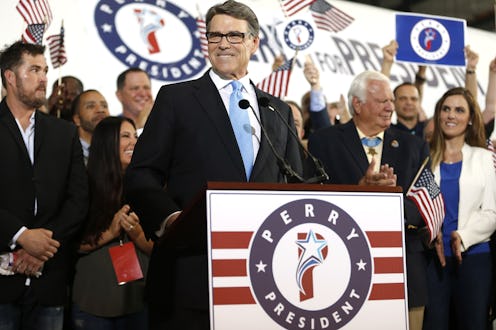News
No One Cares About Prez Announcements
I'm going to tell you something that might shock you — it's been less than three months since Ted Cruz, the first of what would be many 2016 presidential candidates, announced his run. We've been in this 2016 game for what feels like ages, and there's still a long way to go before, you know, 2016. But here's some news from The Washington Post: Americans are becoming less interested in campaign announcements as more candidates enter the field. And here is why that's a good thing for them (and your personal sanity).
WaPo's Philip Bump found that Google searches for GOP candidates surrounding their announcements decreased each time a new one jumped on the bandwagon. When Ted Cruz announced his candidacy on March 23, he made the biggest jump in searches compared to the seven days before and seven days after his Liberty University speech.
Rand Paul, the second GOP contender who announced April 7, still had a decent showing, but didn't come near Cruz's numbers. Marco Rubio, who announced a week after Paul, showed an even further decline in Google searches. Fast forward to Lindsey Graham on June 1, and compared to Cruz, he was barely a blip on the radar.
(Actually, it was George Pataki who was truly a blip on the radar. There wasn't enough data for The Washington Post to include him. This also did not include Rick Perry's announcement on Thursday.)
The amount of news coverage of the candidates follows a similar pattern, as shown in the graphs by The Washington Post.
As Bump notes, the more noticeable yawns during announcements don't really hurt the candidates in the polls. They tend to see a spike in numbers after they announce, and within two weeks they fall around the same range.
I would venture even further into saying that less exposure could actually help their campaigns. Look at the 2012 Republican field, for example. After what seemed like 50,000 primary debates, the GOP candidates had given us an opportunity to see them at their best ... but mostly their worst. It was an issue of overexposure that some say ultimately helped Barack Obama's second campaign.
In 2011, Matt Latimer, adviser to New Gingrich's 2012 campaign, wrote this for The Daily Beast:
I’m not sure which is the more troubling—that I searched for Tuesday’s 132nd televised GOP debate on something called “The Bloomberg Channel” or that I found myself distracted en route by a rerun of Cheers. The episode proved somewhat apropos: a newly engaged Sam and Diane so relentlessly hector an acclaimed British marriage counselor (played by John Cleese) that Cleese finally blurts out, “I’ve grown to hate them.” Which of course brings to mind what many voters may be starting to think of this year’s crop of GOP candidates. Why else would the only person with any momentum in the race be the one voters know the least? Maybe President Obama has an election strategy after all: let the other guys keep talking.
It's not a bad strategy. The less you are the public eye, the less chance you have to screw it up. It also makes your screen time more valuable. With less screen/TV/Internet time, candidates won't waste as much effort on the "let freedom ring" throwaway quotes and will (maybe) focus on actual policy.
Overexposure can also make it harder for people to separate the politician from anything else that could go wrong around them. There was a lot of speculation in 2009 on if Obama was overexposing himself in the first few months of office. A CBS piece posited that he could be the person that could swing being in the public eye forever without it hurting his approval rating, which was around 62 percent at the time.
It didn't last forever. Being the everywhere president could be part of the reason Obama has been the public face of every failure within his administration, his ratings now at 47 percent. His constant presence in the media caused him to be elected as the scapegoat for anything that went wrong ("Thanks, Obama," indeed).
So fear not, Rick Perry. If nobody is Googling you, that could be a good thing.
Images: The Washington Post (3); Getty Images (1)
